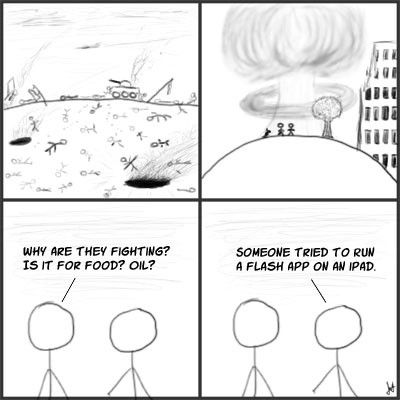Monday, April 19, 2010
Friday, April 16, 2010
Pickstr Goes Alpha
 What a week!
What a week!One of my many side projects, Pickstr, went to public alpha this week, and my days and a lot of my nights have been filled with chatting with alpha testers and integrating their feedback. It's good to reach this point in development.
If you haven't been to the site or are too lazy to click the link and check it out, Pickstr is a web-based game. In it, players select the outcome of such real-world events as sports games, and compete with others to be the most accurate and achieve Guru status. Players also get to wager virtual currency on matches for added fun.
The alpha is all about testing the concept, mechanic, design, technology, etc. and soliciting user feedback before we take the concept to a public Beta some time in the summer. We're collecting data on user preferences and will use the information to improve the product.
One thing I've been reminded about repeatedly this week is how valuable it is to listen to users. The development process comes with a set of blinders, and hearing people new to the experience talk about what they like and dislike is incredibly helpful in understanding the potential of what is being built.
Furthermore, I was surprised to find that working on and playing Pickstr made me more interested in sports. It could have something to do with the number of bad picks I've made and virtual currency lost. I hate to lose.
Next steps for Pickstr include deployment to social and mobile platforms. The prospect of being able to compete in isolation with friends makes Facebook a likely early target. The Twitter angle is also developing, as we explore how to capitalize on the platform's strengths.
I don't wish to make this into a Pickstr development blog, but after almost a week of silence, I felt I should mention what I've been up to. If you've taken the time to try Pickstr, thank you! Be sure to let me know what you think of it - I'm very interested to know.
Thanks again, and enjoy your weekend.
© Jeremy Buehler and Rogue Tendencies (www.roguetendencies.com) 2010.
Thursday, April 8, 2010
iPhone OS4 Means New Opportunities for Game Developers
 After watching the iPhone OS 4 media event live blog coverage I realized the definition of what goes into a gaming platform is becoming fairly standardized for this generation of technology.
After watching the iPhone OS 4 media event live blog coverage I realized the definition of what goes into a gaming platform is becoming fairly standardized for this generation of technology.As I've written before from a slightly different perspective, developers and designers need to develop for platforms that are going to be profitable and technologically viable.
Here's what Apple is making standard-issue in their iPhone OS4:
Multitasking. This addresses the reality that mobile users are likely to be interrupted, and will want to switch out from game to phone call to text message as the need arises.
GameKit. An integrated social network linking friends and their games. While I've not seen details on GameKit, the theory is sound. It certainly worked for Xbox Live, and it's something I've always encouraged in my game and metagame designs.
iAd. A revenue stream for developers. Developers will earn 60% of the ad revenues. And the ads themselves are supposedly game-friendly, in that they will leverage the multitasking abilities of the platform to maintain the game behind the ad. The ads themselves are supposed to give ad designers the ability to leverage HTML5 to create rich media experiences such as in-Ad games and in-Ad purchasing. All very cool, although I find myself wondering if developers get a cut of the in-Ad purchases.
Background GPS Support. While still accompanied with the warning that GPS is battery intensive, the ability for a game to leverage GPS, and an iAd to leverage GPS while spawned from a game, means that Location Based Services will see an upsurge. Again. Smart advertising tailored to where a user is playing their games should make the advertising more relevant and attractive to users. For example, playing a game in a coffee shop spawns an ad for the coffee shop, opposed to some random store nowhere near the user. Pretty cool stuff, as far as crappy advertising goes.
While critics of iPhone OS 4 will have a field day with the iPhone 3G not supporting multitasking, the platform is becoming well-rounded and will continue to appeal to users and games developers alike. The iPhone will be a center for innovation for the next year, and I'm excited to see what developers do with it.
© Jeremy Buehler and Rogue Tendencies (www.roguetendencies.com) 2010.
Labels:
digital advertising,
game design,
games,
gaming,
iPhone,
mobile,
social web,
technology and society
Wednesday, April 7, 2010
The Internet of Things Will Improve Augmented Reality Games
 After reading this article about big network players talking-up the 'Internet of Things' I got thinking about how awesome it could be when more everyday things get connected to the internet. In some ways, the more mundane, the greater the potential... not just for the thing itself, but for how all other things interact with it.
After reading this article about big network players talking-up the 'Internet of Things' I got thinking about how awesome it could be when more everyday things get connected to the internet. In some ways, the more mundane, the greater the potential... not just for the thing itself, but for how all other things interact with it.Here's an example to clarify what I mean:
The newspaper box. They are found on train platforms, many street corners, basically anywhere that makes sense in terms of having enough pedestrian traffic to make them convenient. Today, they are pretty dumb machines. But in the future where they are part of an internet of things, someone will put a cheap cellular or wifi transmitter in them and a CPU. And they will begin to broadcast information to the world.
On the one hand, they could broadcast private information to the company that owns them. For example, the current state of newspaper supply. Or how much money is in them. And the advantage to the company would be to ensure they are never empty, or never carrying too much cash. In the case of newspaper boxes offering monthly publications, or weeklies, this could ensure no reader finds them empty. Thus, the newspaper box is improved.
On the other hand, the same newspaper box could broadcast public information. For example, it could broadcast its location, what publications it offers, etc. to nearby mobile phones or mobile computers. Very handy for advertisers and so forth, and for people looking for something to read.
And here's where the concept of connected things gets fun. If an object broadcasts its existence on the internet, then other systems can take that information and do something with it. This has great potential for things like augmented reality games.
Augmented reality games are today limited to things like global positioning systems, accelerometers and input via such tools as barcode scanners to add relevance to a user's surroundings. But in the future of the internet of things, the number of inputs available to augment a user's reality skyrockets.
Back to our newspaper box example. A user wears an augmented reality device such as a pair of display glasses. They start the game 'Super Ultra Crazy Zombie Shooter' (I made that up. I think.) and sit down on a park bench. The game immediately picks up their location via GPS, and facing via the built-in accelerometer. Then, it takes into account all the broadcasting things in the area and cross references their type with a master database. One of the things it 'sees' is our broadcasting newspaper box.
It loads up a zombie, and hides it behind the newspaper box, occasionally having it stand up to through zombie bits at the user. The user, in turn, targets the creature with its zombie shooting gun and fires. The game takes into account the standard dimensions of the newspaper box, applies some line-of-sight physics analysis, and if the newspaper box isn't in the way, allows the user to hit the zombie.
Then another zombie appears from behind a park bench across the way, and from a store doorway, and from a manhole cover, and, and, and...
Very soon you have a very cool game environment made to come to life through the internet of things.
Can't wait!
© Jeremy Buehler and Rogue Tendencies (www.roguetendencies.com) 2010.
Tuesday, April 6, 2010
Will Technology Deliver Ghost in the Shell?
 I recently saw a story about some university students who made a glove mouse much like the one Tom Cruise uses in Minority Report. I am a big fan of real life technology catching up with the super-fantastic technology of science fiction. And the glove got me thinking about what science fiction most accurately reflects where I think technology is headed today.
I recently saw a story about some university students who made a glove mouse much like the one Tom Cruise uses in Minority Report. I am a big fan of real life technology catching up with the super-fantastic technology of science fiction. And the glove got me thinking about what science fiction most accurately reflects where I think technology is headed today.I came up with Ghost in the Shell. It is an Anime franchise based on a manga by Shirow Masamune. The stories follow the exploits of a special government security force formed as a counter-terrorist unit. The setting is a very futuristic, highly technological Japan.
The stories are aimed at teens/adults and deal with very complex issues around the integration of technology and society, sitting at the frontier between the real and virtual worlds. It represents a vast collection of ideas near the end of what I like to think today's technology can take us; at the point where current technology moves on to the next logical developments.
And that's what makes it exciting. Here are some of the 'almost' technologies portrayed in the franchise that are pretty much inevitable:
Personal Cloaking Devices. Some members of the anti-terrorist team wear special clothing that bends light around them, making difficult and dangerous infiltrations lower risk and spying easier. Today, scientists are already working on similar technologies and the concept passes my 40 year test - I will probably be alive to see this sci-fi concept become real in the next 40 years.
Intelligent Windows. I am referring to the dumb windows found in most buildings today becoming bigger, faster and stronger. Dumb today, because all they do is let light through and keep the elements out. Boring. In the Ghost in the Shell world, windows are also display screens for computers and media devices. No more curtains, just touch a button (or the window itself) and it switches from transparent to opaque. Touch another, and you're watching a big screen TV. The concept also made an appearance in the first Iron Man movie, and it's practical enough to pass the 40 year test.
Cybernetics. The melding of flesh and machine to replace some of the biological parts of a body with mechanical ones is not an original idea, but it's a central point in the franchise as the main characters struggle with the virtual line between man and machine. At what point is humanity separated from the technology we use? As we become more dependent on technology it becomes part of how we exist. But what of our souls? If you remove the body, what remains? All weighty philosophical debates that will wage on in the next 40 years, guaranteed.
Augmentative Devices. I separate this from cybernetics because augmentative devices do not necessarily replace body parts, but still make a body 'better'. The Ghost in the Shell franchise is full of them. While traditional mobile phones exist, for example, most of the tech elite use implanted communications devices - the ultimate in hands-free. People entrust memories to external devices and make back-ups. People connect to the internet using data ports in their bodies (WiFi didn't make it big in the Ghost in the Shell universe, apparently). As we toy with Augmented Reality and seek a better device for it, I definitely put augmentative devices on the 40 year list.
Automated Transit. Basically, cars that drive themselves. This is an idea that is so prevalent in sci-fi that it's practically a given. In fact, some companies are already putting concepts to the test. Forty year list? Definitely.
Crime. As we struggle to make technology do the things we do, we open the gates on a world of exploitive opportunities for criminals. It's happening today with the likes of the recent Google hack; and it will continue to happen and become more sophisticated over time as technologies develop and become mainstream. Sadly, 'cyber crime' makes it onto the 40 year list by default.
Unknown Threats. While I have faith in science there are risks with exploring any frontier, and while I hope I will be proved wrong, I can't help feel threats to the technology model will appear in the next 40 years. I'm not implying society won't grow to deal with them. This story about a Korean couple that let their child die of malnutrition while they played a video game about raising a child brings it home.
With great power comes great responsibility, indeed.
© Jeremy Buehler and Rogue Tendencies (www.roguetendencies.com) 2010.
Monday, April 5, 2010
Friday, April 2, 2010
Happy Easter
Today I offer nothing more than my hope that you also have a three day weekend and beautiful spring weather to go with it.
Enjoy, and remember to take time to enjoy the simple things.
© Jeremy Buehler and Rogue Tendencies (www.roguetendencies.com) 2010.
Enjoy, and remember to take time to enjoy the simple things.
© Jeremy Buehler and Rogue Tendencies (www.roguetendencies.com) 2010.
Thursday, April 1, 2010
Barriers to Digital Product Sales Encourage Piracy
 I've mentioned before via Twitter that the world would be a better place if it was as easy to buy digital goods as it is to steal them.
I've mentioned before via Twitter that the world would be a better place if it was as easy to buy digital goods as it is to steal them. There are options that are close; the Apple iTunes store, Amazon and its Kindle, Netflix, Steam, etc. But each of them pale in comparison to going to a bittorrent site, finding and downloading the same product.
Each 'official' delivery mechanism brings with it barriers to the products they offer. For me the iTunes store brings with it a heritage of 'once bitten, twice shy' bad proprietary mac-friendly software; Kindles haven't been available in Canada; nor is the Netflix service; and Steam is a lot of bloat and marketing to wade through to get to the game I want to play. Each comes with a common barrier of signing up and signing in for service, and entry of credit card information for billing purposes at least once.
There are also barriers in the bittorrent world, like product quality, and product format, but there are software solutions to overcome them. Some sites are public and don't require a sign up or in, and the crowd helps keep the content in check by providing information on quality.
After watching Cory Doctorow's talk to book publishers about his views on the developments in epublishing, I think there is at least another barrier to the legal way of acquiring digital content.
I have no qualms about paying for content, but when doing so in environments designed to fill many pockets I can't help feel I'm paying for more than just the product. As a consumer I don't like paying for things I'm not interested in supporting, such as unnecessary middlemen or the inflated cost of goods due to price discrimination.
I'm certain the conflict between 'information wanting to be free' and 'earning income for the production of goods' will extend far into the digital future. But until businesses start to break down the barriers they create to obtaining the goods they sell, buyers will continue to seek out the path of least resistance.
© Jeremy Buehler and Rogue Tendencies (www.roguetendencies.com) 2010.
Subscribe to:
Posts (Atom)






